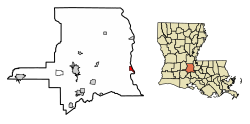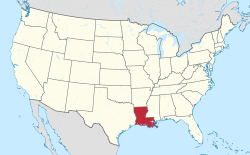Krotz Springs is a town in St. Landry Parish, Louisiana, United States, on the Atchafalaya River. The population was 1,198 at the 2010 census, down from 1,219 in 2000. It is part of the Opelousas–Eunice Micropolitan Statistical Area.
Krotz Springs, Louisiana | |
|---|---|
Town | |
| Town of Krotz Springs | |
 Location of Krotz Springs in St. Landry Parish, Louisiana. | |
 Location of Louisiana in the United States | |
| Coordinates: 30°32′15″N 91°45′18″W / 30.53750°N 91.75500°W | |
| Country | United States |
| State | Louisiana |
| Parish | St. Landry |
| Government | |
| • Mayor | Carroll Snyder (D) |
| Area | |
• Total | 1.73 sq mi (4.49 km2) |
| • Land | 1.73 sq mi (4.47 km2) |
| • Water | 0.01 sq mi (0.01 km2) |
| Elevation | 30 ft (9 m) |
| Population (2020) | |
• Total | 904 |
| • Density | 523.15/sq mi (202.02/km2) |
| Time zone | UTC-6 (CST) |
| • Summer (DST) | UTC-5 (CDT) |
| ZIP | 70750 |
| Area code | 337 |
| FIPS code | 22-40280 |
| Website | krotzsprings |
History
editAround the turn of the 20th century, an Ohio native, Charles William Krotz, bought 20,000 acres (81 km2) of woodland around the Atchafalaya Basin and set up a sawmill to trim the trees hauled out of the basin. The tiny settlement that grew up around the mill was called Latania (fan palm), after the bayou of the same name and the types of palm plants found in the area.
Thinking he was sitting on an untapped pool of oil, Krotz attempted to drill the first oil well in St. Landry Parish in 1900, but he struck water instead of oil, the result becoming known as Krotz’s spring. The spring was used to supply water for the developing sawmill town, and Krotz even bottled the water, selling it throughout the country.[2]
In 1909, a post office was established in the town, and the obvious choice of a name was Krotz Springs.[3]
The Krotz Springs Bridge spanning the Atchafalaya River opened in 1928 and carried railroad and automobile traffic.[4] It was superseded by other bridges at the same location in 1934, 1973, and 1988.[5]
Mayors
editRobert A. Moran, a Democrat served as mayor from 1986 until his death in May 1987. On November 21, 1987, James Rasie Nall defeated Ina Moran (D) in a runoff election for mayor.[6] Four years later, on October 6, 1990, Gary Soileau (D) defeated Larry Martinez, Sr. (D), in a landslide victory with 86 percent of the ballots cast.[7] Soileau would remain mayor until he retired in 2010, when he was succeeded by current mayor Carroll Snyder, another Krotz Springs Democrat.[8]
List of most Krotz Springs Mayors since 1917:
| Charles W. Krotz | 1917 - 1925 |
| Lester Lemoine | 1926 - ? |
| James Edward Helton | 1930 - 1932 |
| Ralph DelBuono | 1932 - ? |
| Eddie Eusay | 1944 - 1950 |
| Clinton C Artigue | 1950 - 1954 |
| Eddie Eusay | 1955 - 1956 |
| Robert Humphreys | 1956 - 1958 |
| James Rasie Nall | 1958 - 1986 |
| Robert A Moran | 1986 - 1987 |
| James Rasie Nall | 1987 - 1989 |
| Gary Soileau | 1989 - 2010 |
| Carroll Snyder | 2010 – Present |
Geography
editKrotz Springs is located at 30°32′15″N 91°45′18″W / 30.53750°N 91.75500°W (30.537565, -91.754926).[9] On the eastern border of the town is Pointe Coupee Parish over the Atchafalaya River via U.S. Highway 190 while Opelousas, the St. Landry Parish seat, is located 20 miles (32 km) west of Krotz Springs. The city of Baton Rouge is located 40 miles (64 km) to the east.
According to the United States Census Bureau, the town has a total area of 1.7 square miles (4.4 km2), all land.
Demographics
edit| Census | Pop. | Note | %± |
|---|---|---|---|
| 1920 | 247 | — | |
| 1930 | 449 | 81.8% | |
| 1940 | 630 | 40.3% | |
| 1950 | 866 | 37.5% | |
| 1960 | 1,057 | 22.1% | |
| 1970 | 1,435 | 35.8% | |
| 1980 | 1,374 | −4.3% | |
| 1990 | 1,285 | −6.5% | |
| 2000 | 1,219 | −5.1% | |
| 2010 | 1,198 | −1.7% | |
| 2020 | 904 | −24.5% | |
| U.S. Decennial Census[10] | |||
2020 census
edit| Race | Number | Percentage |
|---|---|---|
| White (non-Hispanic) | 827 | 91.48% |
| Black or African American (non-Hispanic) | 7 | 0.77% |
| Native American | 5 | 0.55% |
| Asian | 1 | 0.11% |
| Other/Mixed | 37 | 4.09% |
| Hispanic or Latino | 27 | 2.99% |
As of the 2020 United States census, there were 904 people, 373 households, and 242 families residing in the town.
2010 census
editAs of the 2010 United States Census, there were 1,198 people living in the town. The racial makeup of the town was 97.2% White, 0.2% Black, 0.3% Native American, 0.4% Asian and 0.3% from two or more races. 1.5% were Hispanic or Latino of any race.
2000 census
editAs of the census[12] of 2000, there were 1,219 people, 490 households, and 339 families living in the town. The population density was 705.0 inhabitants per square mile (272.2/km2). There were 562 housing units at an average density of 325.0 per square mile (125.5/km2). The racial makeup of the town was 99.10% White, 0.25% African American, 0.08% Native American, 0.08% from other races, and 0.49% from two or more races. Hispanic or Latino of any race were 0.74% of the population.
There were 490 households, out of which 34.9% had children under the age of 18 living with them, 52.4% were married couples living together, 11.8% had a female householder with no husband present, and 30.8% were non-families. 26.9% of all households were made up of individuals, and 12.9% had someone living alone who was 65 years of age or older. The average household size was 2.49 and the average family size was 2.99.
In the town, the population was spread out, with 26.9% under the age of 18, 11.4% from 18 to 24, 28.0% from 25 to 44, 20.2% from 45 to 64, and 13.5% who were 65 years of age or older. The median age was 33 years. For every 100 females, there were 95.4 males. For every 100 females age 18 and over, there were 87.2 males.
The median income for a household in the town was $26,823, and the median income for a family was $31,842. Males had a median income of $29,167 versus $21,875 for females. The per capita income for the town was $13,914. About 17.5% of families and 22.5% of the population were below the poverty line, including 25.6% of those under age 18 and 18.3% of those age 65 or over.
As of 2010, 77.39% of the population identified themselves as belonging to a faith community; of these 86.5% were Catholic, 9.4% were Southern Baptist and 2.4% were Churches of Christ.[13]
According to the American Community Survey of 2010-2014, 82.2% of residents identify as having either French or French Canadian ancestry.[14]
Film history
edit- 1966: The prison camp scenes in Nevada Smith, starring Steve McQueen, were filmed just west of Krotz Springs in the 2 O'Clock Bayou area.[15]
- 1969: The final scene of Easy Rider, starring Peter Fonda and Dennis Hopper, was filmed a few miles north of there,[16] in which the two main characters are shot by two local residents, David C. Billodeau and Johnny David, on Louisiana Highway 105.[17]
- 1998: In the film Out of Sight, starring George Clooney and Jennifer Lopez, two of the main characters lose control of their vehicle coming down the Atchafalaya River Bridge on U.S. Route 190 Westbound.[18]
References
edit- ^ "2020 U.S. Gazetteer Files". United States Census Bureau. Retrieved March 20, 2022.
- ^ Hartley, Carola Lillie. "A man named Krotz". Daily World. Retrieved March 31, 2021.
- ^ "www.cajuntravel.com "KROTZ SPRINGS"". Archived from the original on October 6, 2007. Retrieved September 21, 2007.
- ^ "Atchafalaya River Bridge Opened". The Rayne Tribute. July 7, 1928. p. 1.
- ^ "Atchafalya Bridge in Krotz Springs renamed on Wednesday | KLFY". Archived from the original on April 15, 2018. Retrieved March 31, 2021.
- ^ St Landry Parish. Louisiana Secretary of State, Elections Division. November 21, 1987.
- ^ St Landry Parish. Louisiana Secretary of State, Elections Division. October 6, 1990.
- ^ St Landry Parish. Louisiana Secretary of State, Elections Division. October 2, 2010.
- ^ "US Gazetteer files: 2010, 2000, and 1990". United States Census Bureau. February 12, 2011. Retrieved April 23, 2011.
- ^ "Census of Population and Housing". Census.gov. Retrieved June 4, 2015.
- ^ "Explore Census Data". data.census.gov. Retrieved December 29, 2021.
- ^ "U.S. Census website". United States Census Bureau. Retrieved January 31, 2008.
- ^ "Krotz Springs, Louisiana (LA 70750, 71353) profile: population, maps, real estate, averages, homes, statistics, relocation, travel, jobs, hospitals, schools, crime, moving, houses, news, sex offenders". www.city-data.com.
- ^ "Louisiana French as First Ancestry Population Percentage City Rank Based on ACS 2010-2014 data". www.usa.com. Retrieved March 12, 2021.
- ^ "Nevada Smith (1966) - IMDb". IMDb.
- ^ [30°45′39″N 91°45′51″W / 30.76083°N 91.76417°W]
- ^ "Easy Rider (1969) - IMDb". IMDb.
- ^ "Out of Sight (1998) - IMDb". IMDb.